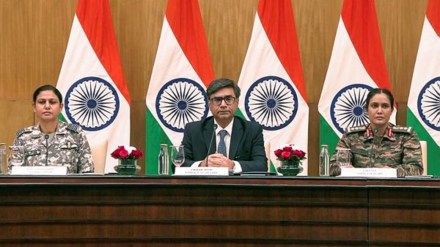India strikes Pakistan: The recent developments following India’s execution of Operation Sindoor have garnered significant attention globally. The Indian Ministry of External Affairs (MEA), through Foreign Secretary Vikram Misri, elaborated on the reasons behind India’s actions, the escalation caused by Pakistan, and India’s non-escalatory response to provocation. Here are the key takeaways:
1. India’s response to Pakistan’s attacks
India’s decision to neutralise the air defense system in Lahore, was directly linked to Pakistan’s repeated attacks on Indian military sites. The move was a direct retaliation against Pakistan’s unprovoked aggression, specifically its shelling along the Line of Control (LoC) and targeting of Indian civilians. According to Foreign Secretary Vikram Misri, India’s response was “non-escalatory, precise, and considered.” India has repeatedly emphasised that it only targeted terrorist infrastructure within Pakistan, adhering to a measured approach.
2. Pak shelling in border areas and civilian casualties
Pakistan has been relentlessly firing shells and mortars along the LoC in Jammu and Kashmir, causing significant casualties. Since May 6, 2025, at least 16 civilians have been killed, including women and children, and 59 others have been injured. The Pakistani shelling targeted areas like Kupwara, Baramulla, Uri, Poonch, and Mendhar, leading to widespread destruction. India has clarified that its actions were strictly retaliatory, in response to Pakistan’s aggression.
3. Fact-checking Pakistan’s claims of shooting down Rafale jets
India has actively fact-checked the numerous claims made by Pakistan regarding the events. For instance, the Pakistani claim that they shot down three Rafale and MiG aircrafts was quickly debunked by Indian officials, who pointed to the legacy of misinformation and deceit within Pakistan’s statements. Foreign Secretary Misri noted that this is not a new behaviour for Pakistan, which has a history of distorting facts, starting from the 1947 invasion of Jammu and Kashmir.
4. India’s non-escalatory approach
India made it clear that its response was strictly in retaliation to Pakistan’s original escalation. Misri explained that India’s actions, while precise and effective, were intentionally non-escalatory. India was responding to the original escalation from Pakistan, specifically referencing the terrorist attack in Pahalgam on April 22, 2025, which killed 26 civilians, including a Nepali national. This attack was attributed to Pakistan-based terrorist organizations like Lashkar-e-Taiba.
5. Pakistan sheltering The Resistance Front, proxy unit of LeT
The Resistance Front (TRF), which had claimed responsibility for the Pahalgam attack, attempted to backtrack, but the evidence was clear. India stressed that Pakistan’s involvement in supporting terrorism, especially through its relationship with groups like Lashkar-e-Taiba, was well-documented. Furthermore, Pakistan’s proposal to join a neutral investigation into the attacks was dismissed by India as a mere ‘delaying tactic’, aimed at obstructing the probe rather than cooperating genuinely.
6. Pakistan’s targeted attacks on Sikhs
Pakistan launched a targeted attack on the Sikh community in Jammu and Kashmir. A Gurudwara in Poonch was hit, and three Sikh civilians were killed. This attack highlights Pakistan’s continued support for terrorist activities against civilian populations, in stark contrast to its claims of not harbouring terrorists.
7. Pakistan’s misuse of religious sites for terrorist training
India also pointed out Pakistan’s misuse of religious sites for radicalising and training terrorists. Pakistan’s involvement in supporting and harbouring terror groups like Lashkar-e-Taiba has been well-established, and its consistent denial is seen as a cover for its true intentions.
8. Indus Water Treaty
On the issue of the Indus Water Treaty, India’s Foreign Secretary highlighted the changing circumstances that necessitate a review of the treaty’s parameters. Pakistan has created several legal roadblocks over the years, obstructing India’s rights over the Western rivers. India has been patient, adhering to the treaty despite provocations, but Misri made it clear that the conditions have now changed and that technological advancements must be considered in any future deliberations. He stated that India did not target the Jhelum dam in Pakistan.
9. Pakistan’s continuous denial of harbouring terrorism
The developments on May 7, 2025, are a clear indication of India’s commitment to defending its territorial integrity while avoiding unnecessary escalation. By targeting only terrorist camps in Pakistan and responding to Pakistan’s provocations, India has shown that its actions are measured and focused on ensuring national security. Meanwhile, Pakistan’s denial of its involvement in terrorism and its repeated attempts to mislead the international community continue to raise concerns.
Foreign Secretary Vikram Misri exposed Pakistan’s tacit support for terror groups like Lashkar-e-Taiba and Jaish-e-Mohammed. Misri questioned the state funerals given to terrorists, particularly those with military honors. He pointed out the oddity of civilians’ funerals being draped in Pakistani flags and attended by military officials. Misri highlighted a photo showing Hafiz Abdul Rauf, a US-designated global terrorist, leading funeral prayers for those killed in Indian strikes, calling it a troubling practice.
10. India to urge IMF to review Financial aid to Pakistan
Foreign Secretary Vikram Misri highlighted India’s position at the International Monetary Fund (IMF), stating that India’s executive director at the IMF will present the country’s stance during the upcoming board meeting. He emphasised that while board decisions are separate, the case regarding Pakistan should be clear to those who continue to provide financial aid to the country.
